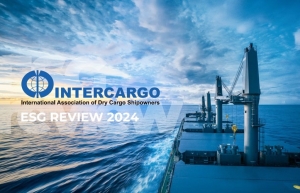


(Posted on 02/05/24)
The evolving Environmental, Social, and Governance (ESG) agenda is not merely a prerequisite for operating in the dry bulk shipping industry of the 21st century; it is a roadmap for thriving amidst challenges and securing sustainable success, says The International Association of Dry Cargo Shipowners (INTERCARGO).
Summarising INTERCARGO’s newly published ESG Review, Kostas Gkonis, INTERCARGO Secretary General advised that “a forward-looking attitude is certainly required when addressing key aspects shaping the future of maritime operations and the dry bulk shipping sector more particularly.”
“Dry bulk shipping should embrace the ESG agenda as a catalyst for innovation, resilience, and long-term success and to effectively communicate its impact on and commitment to sustainability,” he said.
By proactively addressing environmental and social challenges, fostering robust governance practices, and embracing a purpose-driven culture, the dry bulk shipping sector can navigate present and future complexities, while charting a course toward sustainable prosperity for societies around the world, the ESG Review declares.
INTERCARGO’s first-ever ESG Review identifies key steps that the dry bulk shipping sector is taking in the fields of environment, social and governance. Highlighting safety as both a key priority and an area of increasing success, the report points to significant improvements to dry bulk ship safety over the past decade, achieved alongside substantial growth in the global dry bulk fleet.
Dr Gkonis pointed out: “Seafarers' well-being tops the list of our priorities. Ensuring their safety and welfare is imperative for our sector’s future. People remain the cornerstone of our business model and success.”
Decarbonisation stands out as a paramount environmental challenge for ship operators in the dry bulk shipping sector, alongside other environmental concerns such as waste management, hazardous materials disposal, and ballast water impacts. With Non Governmental Organisation status at the International Maritime Organization (IMO), INTERCARGO is working proactively towards shipping’s 2050 net zero goals and in particular to deliver decarbonisation with safety. Dr Gkonis commented: “While technological uncertainties persist, embracing innovation is essential. Moreover, prioritising talent development and fostering a culture of innovation are critical for attracting and retaining top talent to meet the demands of the future.”
Dr Gkonis observed: “A clear sense of purpose, coupled with robust governance structures, is crucial for fostering a sustainable and resilient business model, ultimately striving for stronger, safer, and more sustainable dry bulk shipping practices.”
INTERCARGO chairman Dimitrios Fafalios commented: “INTERCARGO’s ESG Review highlights that ESG has become an increasingly important topic for all stakeholders in the dry bulk shipping community, such as investors, financiers, charterers, cargo owners, insurers, employees, and non-governmental organisations.”
Torvald Klaveness has announced the decision to consolidate all digital services under Klaveness Digital... Read more
The International Association of Dry Cargo Shipowners (INTERCARGO) has renewed its call for straightforward... Read more
The Swedish Club has delivered strong results for 2024, posting a USD 34 million profit and significantly... Read more
In line with NORDEN’s positive long-term outlook for Capesize freight rates, the company have... Read more
OrbitMI, a global provider of maritime software and data products, has expanded its workflow capabilities... Read more
Current ClassNK Senior Vice President Hayato Suga has been appointed as President & CEO as well... Read more
The surge in demand for Cape Size bulk carriers will continue for another six weeks, driven on by increased... Read more
OrbitMI, a leading provider of maritime SaaS software, has announced that Istanbul-based Statu Shipping... Read more
“The International Association of Dry Cargo Shipowners (INTERCARGO) is deeply saddened by the... Read more
As the shipping industry continues its transition to carbon-neutral fuels, ammonia and hydrogen are... Read more